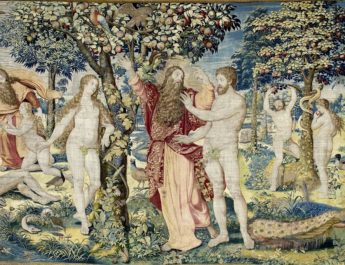Titus 3:4-7
Christmas Dawn ABC
4 But when the goodnessA and loving kindnessB of GodC our SaviorD appeared,E 5 he savedF us, not because of any works of righteousnessG that we had done, but according to his mercy,H through the waterI of rebirthJ and renewalK by the HolyL Spirit.M
A “goodness” = chrestotes. 10x in NT. From chrestos (good, gentle, kind, employed; properly, this is useful, productive, beneficial, or benevolent, gracious; Chrestus was an often used slave name in Greco-Roman world); from chraomai (to use or make use of, take advantage of, treat, bring what is needed; it implies to employ or the way one acts towards someone else). This is goodness, excellence, uprightness, kindness, gentleness, and integrity. It refers to what is really needed – acting in such a way that corresponds to the real needs of people or the situation. It can also speak to moral goodness and excellence in character.
B “loving kindness” = philanthropia. 2x in NT. From the same as philanthropos (humanly, kindly, human, courteous); from philos (beloved, dear, friendly, fried; someone that is loved or cared for in a personal sense – a confident; this is love based on personal engagement and not love in an abstract sense) + anthropos (person, humankind; refers to all genders). This is love for humanity, kindness, benevolence. Literally, it refers to the level of kindness that one gives to a friend (but is extended to others). This is where the term “philanthropy” comes from.
C “God” = theos. From Proto-Indo-European origins, meaning do, put, place. This is God or a god in general.
D “Savior” = soter. From sozo. (to save, heal, preserve, or rescue. Properly, this is taking someone from danger to safety. It can be delivering or protecting literally or figuratively.); from sos (safe, rescued, well). This is savior, deliverer, preserver.
E “appeared” = epiphaino. 4x in NT. From epi (on, upon, against) + phaino (to bring light, cause to appear, shine, become visible or clear); from phos (light, firelight, a source of light, radiance; light with reference to what it “brings to light”). This is to show forth, appear, shine on, become visible or become known. This word shares roots with “epiphany.”
F “saved” = sozo. Related to “savior” in v4 (see note D).
G “righteousness” = diakaiosune. From diakios (correct, righteous – implies innocent; this is that which conforms to God’s notion of justice, uprightness); From dike (the principle of justice; that which is right in a way that is very clear; a decision or the execution of that decision; originally, this word was for custom or usage; evolved to include the process of law, judicial hearing, execution of sentence, penalty, and even vengeance; more commonly, it refers to what is right); may be from deiknumi (to show, point out, exhibit; figurative for teach, demonstrate, make known). This is judicial or divine approval of character or action. This is righteousness, justice, justness, divine righteousness.
H “mercy” = eleos. This is pity, compassion, or mercy whether human or from God. This is where the mercy part of “kyrie eleison” comes from.
I “water” = loutron. 2x in NT. From louo (to bathe or wash. It can be a literally bathing or a ritual one so, figuratively, it can mean cleansing from sin. Here, washing means the whole body). This word is washing, a bath of water, water for washing. It could be a bath that is public or private. This word is used figuratively for baptism.
J “rebirth” = paliggenesia. 2x in NT. From palin (back, again, further, another, anew) [may be from the same as pale (to wrestle, struggle, fight); from pallo (to sway or vibrate)] + genesis.(origin, birth, lineage, life) [from the same as genea (family, generations; by implication an age and, thus, infinity); from ginomai (to happen, become, be born)]. This is regeneration, renewal, new birth. Used specially for Messianic restoration.
K “renewal” = anakainosis. 2x in NT. From ana (up, gain, back, anew) + kainos (new, fresh, novel; an innovation, not necessarily young). This is renewal or renovation. It speaks to a change of heart and life.
L “Holy” = hagios. From hagnos (holy, sacred, pure ethically, ritually, or ceremonially; prepared for worship, chaste, unadulterated, pure to the core; undefiled by sin; figurative for innocent, modest, perfect). God is totally different from humanity and thus set apart. That which is consecrated to worship God (elements of worship) or to serve God (as the saints) are holy because they are now set apart for God’s purposes. Holy because important to God. This is sacred physically, pure. It can be morally blameless or ceremonially consecrated.
M “Spirit” = pneuma. From pneo (to blow, breath, breathe hard). This is wind, breath, or ghost. A breeze or a blast or air, a breath. Figuratively used for a spirit, the human soul or part of us that is rational. It is also used supernaturally for angels, demons, God, and the Holy Spirit. This is where pneumonia comes from.
6 This Spirit he poured outN on us richlyO through JesusP ChristQ our Savior, 7 so that, having been justifiedR by his grace,S we might become heirsT according to the hopeU of eternalV life.W
N “poured out” = ekcheo. From ek (from, from out of) + cheo (to pour). This is pouring, whether a liquid of a solid. It implies an abundant pouring – to gush forth or spill.
O “richly” = plousios. 4x in NT. From ploutos (wealth, riches; abundance – either physical or spiritual; wealth as a fullness of money or possessions or something intangible); from polus (much, many, a high number, abundant); OR it could be from pletho (to fill or fulfill to the maximum extent – to individual capacity). Either way, this is richly, abundantly, copiously.
P “Jesus” = iesous. From Hebrew Yehoshua (Joshua, the Lord is salvation); from YHVH (proper name of the God of Israel; the self-existent and eternal one); from havah (to become) or from hayah (to come to pass, become, be) + yasha (to deliver, defend, help, preserve, rescue; properly, to be open, wide or free, which implies being safe. So, in a causative sense, this is to free someone. This is Jesus or Joshua in Greek – the Lord saves or the Lord is salvation.
Q “Christ” = christos. From chrio (consecrate by anointing with oil; often done for prophets, priests, or kings). Literally, the anointed one, Christ. The Greek word for Messiah.
R “justified” = diakaioo. Related to “righteousness” in v5. From diakaios (see note G). This is to show oneself to be righteous or declare righteous. It can also be defending someone else’s cause – to plead someone’s innocence. This is used in a legal sense and figuratively in a spiritual one. To show something is right or meeting the fitting standard.
S “grace” = charis. This is grace, kindness, favor, gratitude, thanks. It is the sense of being inclined to or favorable towards – leaning towards someone to share some good or benefit. This can be literal, figurative, or spiritual. It is grace as abstract concept, manner, or action.
T “heirs” = kleronomos. 15x in NT. From kleros (a lot – as in casting lots; one would cast lots to determine the distribution of inheritance; this is a portion, share, or heritage); [may be from klero (to cast a lot) OR from klao (to break into pieces)] + from the same as nomos (law, custom; the law of humans or of God; can also refer to the first five books of the Bible or Old Testament scriptures in general) [from nemo (to parcel out)]. This is heir or inheritor, whether literal or figuration. By implication, it is one who possesses.
U “hope” = elpis. From elpo (to anticipate, expect, or welcome; generally denotes a pleasant anticipation). This is expectation, hope, trust, confidence, faith. It can be expectation in a concrete or abstract sense.
V “eternal” = aionios. From aion (an age, length of time). This is agelong, forever, everlasting. Properly, that which lasts for an age. This is where eon comes from.
W “life” = zoe. From zao (to live, be alive). This is life including the vitality of humans, plants, and animals – it is life physical and spiritual and life everlasting.
“Waterfront” by jarfil is licensed under CC BY-NC-SA 2.0




